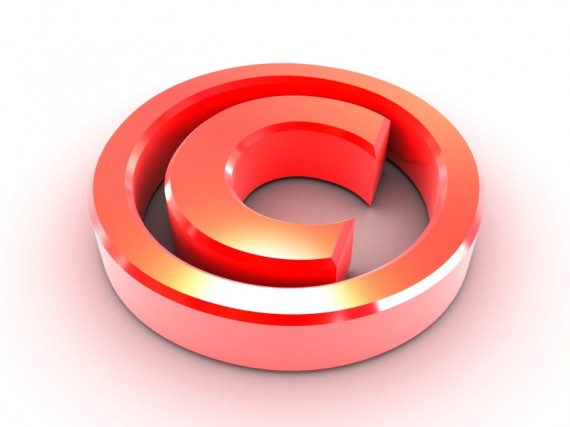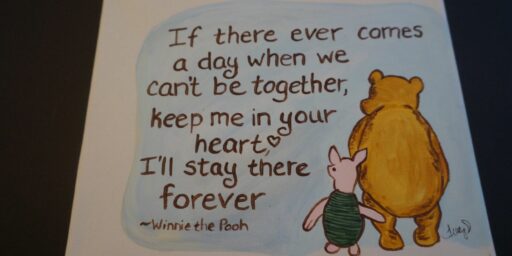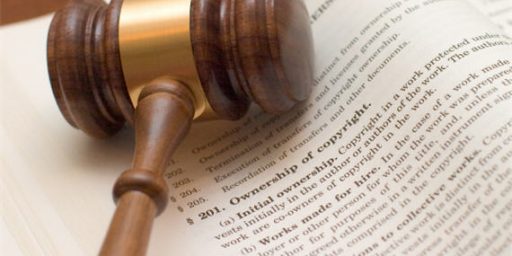Copyright Stupidity
Too many copyright owners are stupidly invoking their rights to keep short clips off of YouTube and other services, losing potential customers in the process.
By the time I saw Jim Hoft‘s post about former President George W. Bush’s throwing out the 1st pitch at yesterday’s Rangers World Series game, the video was replaced by a message that “This video contains content from MLB Advanced Media, who has blocked it in your country on copyright grounds.”
Oddly, by the time I got around to writing a post about how stupid that was, the video was either restored or replaced by another version. (Or, perhaps, DC is considered a different country than Virginia.)
Now, regardless of whether you pine for the days when a real man — who doesn’t wear Mom jeans or throw like a girl (a Muslim girl) and loved his country — was president, I think we can all agree that it was stupid for Major League Baseball to block the video to begin with and smart for them to change their mind (assuming they did).
For one thing, it’s not as if MLB or Fox is going to make any money selling videos of Bush throwing the opening pitch to Nolan Ryan. For another, it’s surely within the domain of Fair Use to show a brief clip for the purposes of offering commentary.
More importantly, though, it’s just bad business. The vast majority of Americans don’t watch professional baseball. And a large chunk of baseball fans likely didn’t watch the game, whether because their team’s out of it, because they had other things to do on Halloween, or whathaveyou. Doesn’t it make sense, then, to allow short videos to circulate and go viral on the Web, in hopes that it will get people talking about baseball?
At the very worst, it’ll have a net effect of zero on MLB’s profits. But, more likely than not, it’ll remind people that the World Series is underway, that it was once upon a time a major American institution, and get a few people to tune in to see who throws out the opening pitch in the next game.
And, no, it’s not just Major League Baseball who does this. Lots of copyright holders take this same approach. The smart ones, like NBC and Comedy Central, have figured out that the best thing to do is to provide the clips on their own sites. But, really, it’s probably best to just let clips of the previous installments of “Saturday Night Live” and “The Daily Show” circulate on the Web to build popularity.







I’d have to disagree with your comment that the vast majority of Americans don’t watch baseball. This is the World Series! Even people who don’t really watch baseball will tune in to see who wins the World Series. I do, however, agree that it was a silly move on the part of MLB to block the video for copyright reasons.
Joe,
Actually, not so much.
Game 1 was the most watched program Wednesday night. But that’s still only 15 million viewers out of 115.9 million TV homes.
Game 2 of the World Series came in third place Thursday night, drawing 12.3 million viewers compared to 14.1 for CSI and 14.6 for The Mentalist.
Game 4 lost to Sunday Night Football.
There are all kinds of copyright holders that make money from YouTube. Why is Lady GaGa’s latest on the YTube? Because they pay here a little something-something every time it is viewed. So maybe (and I’m just talking out of my hat here) MLB was holding out for the same deal? Maybe they got it?
Youtube is the the here and now-not even the wave of the future. Outside of clear infringement, companies and promoters are wise to let it ride and look for ways to make money than trying to shut it down. The horse is out of the barn.
I also agree that in many cases youtube is really a free commercial to promote an item, event or music. Realizing that youtube in many ways is free advertising makes sense.
I have notices that with some things-like and SNL skit/short there will often be a link to the NBC website so the clip is still there for people to see just not on youtube.
As for baseball-we are a non baseball watching family. I honestly don’t know who is playing in the world series other than the Rangers. We are more of a hockey family which probably has even fewer viewers than baseball-regular season baseball.
I couldn’t agree more, James. I’ve been saying for a long time that companies are missing out on a great way to reach audiences. This is especially true for things like baseball or live events, where a highlight or clip could raise interest and cause people to tune into the full thing the next time. Or at the very least help accrue some advertising revenue they would otherwise not be getting. MLB has been especially awful about this, and their half-hearted attempt at adding media content to their own website has only produced a slow and clunky system. How is any company benefiting from archived footage if no one is permitted to see it?
I’m less concerned about this than copyright term. What drives me nuts is that 70 years from now the take down will still be legal.
Our current system of copyrights is one of the many things that are putting drag on our economy and driving income inequality. As evidence for this I would submit the fact that after the rights of copyright holders were broadened and copyrights extended in 1999 the number of copyrights filed actually fell, especially when normalized for population.
Since the constitutional purpose of a copyright is to foster creativity under an appropriately crafted system that wouldn’t have happened.
We pretty much agree on this Dave, but I believe recent legislation reduces need to file, and even reduces need for copyright notice – its default copyright
Iirc studies of total economic gain say go with 35 year copyright
I own about 150 or so copyrights and I have no problem with YouTube or fan fic. That’s not the problem. The problem is not what some individual does, it’s about what some major corporation does. If I let my copyright go it’s Disney or Bertelsman that rips me off. Can someone explain to me how it helps the economy to let NewsCorp screw me out of a 5% cut from some movie deal?
I’m not keeping my copyrighted material out of circulation, or screwing some mash-up artist, I’m insisting on getting paid by billionaires who would prefer to just rip me off.
I’m not seeing how that’s a bad thing.
You may not be. However, the Disneys and NFLs of the world, as is the point of this post, are. Their efforts go so far as to pursue things that are clearly fair use.
However, there's a larger issue. The process of creativity is very rarely the process of creating completely new material out of whole cloth. It's largely on of adapting old material to new uses. If copyright law existed 90 years ago with its present restrictions, much of the great Disney material of the 1920s, 30s, and 40s wouldn't exist because the material on which it's based would have been under copyright.
How would that have been a good thing?
Yes, but if Disney had not known its movies would be protected by copyright they wouldn’t have made them.
And let’s say for the sake of argument that the original story of Snow White had been under copyright. Would that have stopped Disney making a movie? Not likely, they’d simply have had to share the wealth with the original author.
The US has very strong copyright laws — and absolutely dominates the world of movies, TV, books and music. Do you assume the two facts are unrelated? China has just about no copyright. Also no export market for books, movies, etc… (If they ever did start exporting creative their target markets would be countries with strong copyright and they’d avoid markets without it.)
I don’t understand why intellectual property should suddenly become public property when no one proposes doing the same to homes or investments or any other type of property. Bricks can be owned forever but a novel can’t be? Says who? There would be some public good from forcing people to give up their homes after a fixed period — the moving companies would love it, so would banks, property prices would adjust more quickly, I’m sure a rationale could be constructed.
You would never suggest that after 35 years I simply hand over my home to Disney or NewsCorp, but I should hand over a book? Why? In particular, why, given that the “creative” is a field Americans own lock, stock and barrel?
Do you really think song writers, authors, directors, painters would be as willing to take the risks we take — few of us make a good living, few have benefits, few are eligible for unemployment — if we thought whatever we made could simply be snatched away by some Fortune 500 behemoth to copy and use without compensation? An end to copyright is an end to independent creatives, it means we’d only be able to work inside a corporate structure. Do you think we’d get the next John Lennon or Updike or Warhol from the bowels of NewsCorp or Viacom?
Are you familiar with the problem of “clearances,” Michael?
It’s a big business precisely because it isn’t easy. It usually isn’t one author or creator. It’s wanting to shoot a film in a “natural” student dorm and discovering you have to tear down all the posters and remove all the commercial products in sight.
It is a tragedy of the anti-commons.
It is also the reason The Statute of Anne, in 1709, chose to balance rights.
Oh, I guess I should also ask you where it stops Michael. Should your grandchildren live as slackers, just sending take-down notices, collecting royalties, and blocking similar works 100 years from now?
I guess I should also mention, on your ideas/land thing, is that only one person can occupy a spot of land at a time, but an idea can be in a billion heads at a time.
Fundimental difference.
(Note that the Lipton Tea bags pictured with an accompanying article are protected by both copyright and trademark, and cannot be legally used at OTB without a clearance.)
Right. And that’s just silly.
I fully support Lipton’s right to protect their trademark from use by competitors selling tea! They’ve built up a good brand and deserve every protection for the right to use it commercially.
But it would be silly of them to sue me for using their images as illustration for a tangentially related political phenomenon. The perverse effect of which would be to cause people to use, say, Lucianne bags instead and subtly change the association most Americans have with “tea.”
Maybe, maybe not. Great works have been produced well before the invention of intellectual property rights.
And the points isn’t to screw artists and people who are creative out of being compensated, but that the current system actually reducing creation and slowing down the economy….and that a new system is needed where the creative are also rewarded.
To be clear here it isn’t just books and movies that are at issue, but other things like medicines and research. Strategic use of intellectual property rights and laws can hamper such things and make us all worse off to the enrichment of those billionaires.
John:
Say what now?
An idea can be in a billion heads at the same time? You mean the precise wording of a 600 page manuscript can be in the same head at the same time? That’s obviously nonsense.
And yeah, I know about clearances. I’ve been involved in documentary filming. It means we turn a bottle’s label away from the camera. In the ordering of pains in the ass in filming that’s so far down the road it hardly rates.
Steve:
I think a big part of the impetus behind this anti-copyright movement sort of ignores things like books, movies, art, etc… So maybe the point is that we need to redefine what can and cannot be copyrighted. I have no position on medicines, software, etc… I am speaking only from my own personal knowledge of so-called “creatives.”. (I hate the term but I haven’t found a better one.)
From my POV as a writer my potential enemy is not the kid doing a mash-up. In fact I love those kids. Likewise people doing fan fiction. My issue is not with the “little guy” it’s with the very big guys.
I’ve known about fan websites doing digital downloads of my (and my wife’s books) for a long time and never gone after them because the books in question were not available for sale digitally.
Show me a law that protects me from being ripped off by NewsCorp, Disney, Sony etc…, and gives me, let’s say, 50 years exclusive, and lets small time non-profit players use bits and pieces of my stuff, I will be totally okay with it. As I said, I want kids doing riffs on my books, and I don’t want to have to clear all their requests.